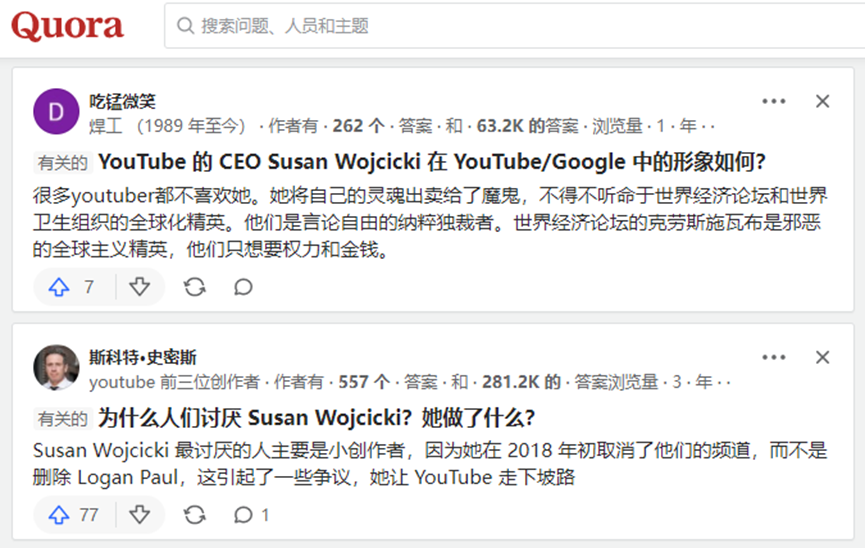YouTube CEO Susan Wojcicki, one of the most powerful female leaders in Silicon Valley, abruptly announced Thursday that she was stepping down from both YouTube and Google.
In her open letter, Wojcicki, 54, said she was starting a new chapter focused on family, health and personal projects she was passionate about. Neil Mohan, an Indian executive who served as her deputy for many years, will succeed her as the head of YouTube.
Wojcicki’s experience is quite legendary. She witnessed the birth of Google and contributed to Google’s acquisition of YouTube, which made YouTube the largest content creation platform in the world. According to statistics, as of the end of 2022, Wojcicki’s private net wealth is 765 million US dollars.
However, she is also a leader in promoting YouTube’s regulation and media entry, which has caused dissatisfaction among countless freelance creators on the YouTube platform, thinking that she has ruined YouTube.

In 1998, Google co-founders Larry Page and Sergey Brin were just students starting a business in Silicon Valley, with no money but dreams. And Wojcicki was just a student at the time, and what was special was that she bought a house in Silicon Valley.
According to later interviews, Wojcicki said that she needed to repay the mortgage at the time, and she was quite tight, so she rented her garage to Page and Brin. Facts have proved that she has a unique vision, and Google, which was conceived in the garage, has become the world’s largest search engine.
In 1999, after Google emerged, the two founders persuaded Wojcicki to join Google and became one of the earliest employees of Google. In 2006, Google bought Wojcicki’s home and used it as a memorial to Google’s fortune. That same year, she advocated for Google’s $1.65 billion acquisition of YouTube.
In 2007, Brin married Wojcicki’s older sister, Anne, and Wojcicki’s relationship with Google grew closer. In 2015, Brin and Anne divorced, and Wojcicki had become one of Google’s core executives by then.
In the 14 years since joining Google, Wojcicki has been responsible for the design and build of Google’s advertising and analytics products. In 2014, she was promoted to head of YouTube, leading the video division’s rapid expansion into the world’s largest video platform.
As of now, according to the company, YouTube now has more than 2.5 billion monthly active users and more than 500 hours of content are uploaded to the platform every hour.
From a financial perspective, in 2022, YouTube will generate $29.2 billion in revenue through advertising sales, accounting for more than 10% of Google’s parent company Alphabet’s total revenue.
mixed reviews
As a key figure in the development of YouTube, Wojcicki is certainly one of the contributors to this platform. Interestingly though, public opinion hasn’t been kind to her since she took over as head of YouTube.
In fact, Wojcicki has become “notorious” among freelance creators for his advertising and censorship policies since taking office. They believe that Wojcicki has single-handedly created a platform where speech is coerced and small creators cannot make money, making YouTube, the world’s leading product, a joke.
In the US version of Zhihu related questions, almost one-sided comment voices said that Wojcicki should step down.
Some people said that Wojcicki used the censorship policy that is unclear and the right of interpretation belongs only to YouTube to restrict freedom of speech and suppress the speeches of black people, LGBTQ and other ethnic minorities.
Additionally, there have been complaints about YouTube’s ad-friendly monetization policies. Creators can earn money from YouTube’s built-in ads if their video content complies with the platform’s regulations and is deemed family-friendly. But on the other hand, if the video content is not popular with YouTube, the creator cannot get advertising and thus cannot make money.
image
Another intriguing event was more coincidental. On Wednesday, U.S. House Judiciary Committee Chairman Jim Jordan issued subpoenas to the chief executives of Alphabet, Amazon, Apple, Meta and Microsoft asking them to explain their companies’ content moderation policies.
Republicans suspect that large technology companies cooperate with the government to restrict the circulation of content and form values and public opinions that are beneficial to certain people or groups, seriously violating citizens’ right to freedom of speech.
And this is precisely the same problem that Wojcicki has been criticized for, which also makes many netizens even less optimistic about Wojcicki.
weak earnings
Regardless of the criticism of Wojcicki by the creators, one thing they seem to be quite right is that YouTube is going downhill.
According to the latest financial report released by Alphabet, YouTube’s advertising revenue in the fourth quarter of last year was US$7.96 billion, a year-on-year decrease of 7.8%, which was also lower than analysts’ expectations of US$8.2 billion.
PP Foresight analyst Paolo Pescatore said that YouTube’s advertising revenue has declined year-on-year for the second consecutive quarter, which is extremely worrying, highlighting the strong threat of short-video content rivals such as Douyin’s international version of Tiktok and Facebook Reels.
This is the first time that Google’s financial report has seen such a downturn, which also makes analysts worry about YouTube’s long-term development. That’s one of the main reasons why Alphabet’s stock has fallen about 10% since the earnings report.
Wojcicki’s sudden departure left some suspense, and whether the new Mohan can change the status quo, the melon eaters and YouTube creators are waiting to see.



